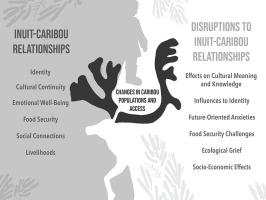Global Environmental Change ( IF 8.6 ) Pub Date : 2021-04-17 , DOI: 10.1016/j.gloenvcha.2021.102268 David Borish , Ashlee Cunsolo , Jamie Snook , Inez Shiwak , Michele Wood , HERD Caribou Project Steering Committee , Ian Mauro , Cate Dewey , Sherilee L. Harper

|
For many Indigenous Peoples in the Circumpolar North, cultural engagement and continuity across generations is directly related to relationships between and among people, animals, and landscapes. However, minimal research outlines the emotional responses and disruptions to culture and identity that are driven by ecological change, and the subsequent cultural dimensions of coping and adapting to this uncertainty. Through a case study that explores how caribou population declines and a caribou hunting ban are impacting Inuit in the Nunatsiavut and NunatuKavut regions of Labrador, Canada, this article examines the critical interplay between cultural continuity and adaptive capacity for responding to ecological uncertainty. More specifically, this study: 1) described the central role that caribou play for Inuit emotional wellness, identity, and cultural continuity; 2) explored how the rapid declines of caribou in Labrador are affecting Inuit emotional wellness, identity, and cultural continuity; and 3) characterized the ways in which Inuit are adapting to these emotio-social, cultural, and ecological changes. Drawing from an Inuit-led, multi-year, multi-media qualitative and visual media research program, data from video interviews (n = 84: Nunatsiavut region: n = 54; NunatuKavut region: n = 30) were analyzed using a video-based qualitative analysis, constant-comparative methods, and inductive qualitative approach. Results indicated that caribou are a foundational element for Inuit emotional wellness, identity, and cultural continuity. The changes in caribou populations are resulting in complex emotional responses, losses to cultural meaning and knowledge, and alterations to Inuit identities. The impacts on emotions, identity, and cultural continuity related to Inuit-caribou relations at an individual and collective level reflect the interconnections between cultural continuity and adaptive capacity that underlie the loss of this culturally important species. Though this research focuses on two Inuit groups and caribou in Labrador, the insights from these lived experiences highlight the ongoing cultural and identity consequences associated with species declines occurring globally.
中文翻译:

“加里伯是原因,其他所有事情都发生在那之后”:驯鹿的减少对加拿大拉布拉多因纽特人的影响
对于北极洲的许多土著民族而言,几代人之间的文化互动和连续性直接与人,动物和景观之间的关系密切相关。然而,最少的研究概述了由生态变化驱动的对文化和身份的情感反应和破坏,以及应对和适应这种不确定性的后续文化层面。通过一个案例研究,探讨了北美驯鹿种群减少和驯鹿禁猎如何影响加拿大拉布拉多Nunatsiavut和NunatuKavut地区的因纽特人,本文考察了文化连续性和适应能力以应对生态不确定性之间的关键相互作用。更具体地说,这项研究:1)描述了驯鹿在因纽特人的情感健康,身份认同,和文化连续性;2)探索了拉布拉多驯鹿的迅速减少如何影响因纽特人的情感健康,身份和文化连续性;3)描述了因纽特人适应这些情绪社会,文化和生态变化的方式。从因纽特人领导的,多年的多媒体定性和视觉媒体研究计划中提取的视频采访数据(n = 84:努纳齐亚武特地区:n = 54; NunatuKavut区域:n = 30)使用以下视频进行了分析:基于定性分析,恒定比较方法和归纳定性方法。结果表明,驯鹿是因纽特人情感健康,身份认同和文化连续性的基础要素。驯鹿种群的变化导致复杂的情感反应,文化意义和知识的丧失,以及因纽特人身份的变更。在个人和集体层面上与因纽特人-驯鹿关系有关的对情感,身份和文化连续性的影响反映了文化连续性和适应能力之间的相互联系,这是该重要文化物种丧失的基础。尽管这项研究的重点是拉布拉多的两个因纽特人群体和北美驯鹿,但从这些活生生的经验中得出的见解凸显了与全球物种减少相关的持续的文化和特性后果。











































 京公网安备 11010802027423号
京公网安备 11010802027423号